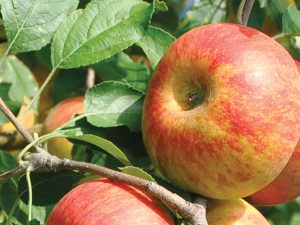Community orchards are a growing movement, with hundreds of new fruit trees being planted each year. In another decade, as the trees reach maturity, we will start to see a significant harvest and they will become a really important resource.
We believe community orchards can be a small, but vital, piece of the puzzle in addressing the multiple crisis of our times – climate, ecological and social. As they grow in popularity and productivity, what can be done to give them more recognition and protection?

Our existing model
As the only UK charity dedicated to community orchards, we care about the culture and practice that makes these spaces successful. Community orchards are about more than just trees, and we focus a lot of time and effort on empowering communities with the skills and confidence they need to manage community orchards for the long term.
You could even argue that community orchards aren’t really about the trees, they are about the people.
Community orchards at their best are many things at once: a social space, a coming together of people to work together on a common task; a celebration of the abundant harvest of fruit; a haven for wildlife and a pocket of biodiversity; a space where a group’s skills and knowledge increases and diversifies.
Challenges faced by community orchards
The challenge of realising and maintaining this ideal described above can be a big one. Individual group members are transient, orchards can get vandalised (intentionally or not) and some orchards don’t make it past those fragile first years.
Publicly accessible mature orchards can also be stripped of fruit, leaving none for those who care for the trees. Urban land is often at risk of being sold for development, or leases are not very secure. There is also often conflict between the local authority’s greenspace management and the wishes of the orchard group.
All of our orchards are open access – anyone can come in and use the space in any way they wish. They are situated in parks, school grounds, community centres, places of worship and other public spaces. They are predominantly urban, and there are many communities using the space for multiple purposes.

A new model: community orchards as ‘commons’?
In 2009, Dr Elinor Ostrom won the Nobel Prize for Economics for her work The Governance of the Commons. She explored different commons systems that have endured for centuries – from Switzerland’s mountain meadows to the forests of Nepal. They were successful because people had come together and collectively formed a set of management principles to make sure that the land or water is not over-used, and that everyone gets a fair share.
A big difference between community orchards and the commons she studied is that in the latter, those with a stake in the land depend on it for their livelihoods, understand its importance to the wider community and collectively value the resource.
By contrast, the management of urban greenspace is largely not very participatory, with the local authority making the decisions, and the public at large often feeling they have unrestricted access to do what they like. Active management at grassroots level, and a positive relationship with more formal authorities, is an integral part of successful commons. I think this a major part of why it is difficult to address the challenges that face community orchards.

Signs of hope on the horizon
However, there are some shifts away from a purely top-down model, at least in Scotland. The 2015 Community Empowerment (Scotland) Act enables the transfer of managing buildings or land from a public body to a community organisation. Critics have suggested this is a way for cash-strapped councils to offload responsibility for expensive assets, but in principle it is a very progressive piece of legislation. Similarly, the Land Reform (Scotland) Act allows communities to buy land with up to £1M grant funding from the Scottish Land Fund.
The Orchard Project is currently working on an exciting food forest project with Viewpark Conservation Group on the outskirts of Glasgow, who successfully bought 170 acres of woodland and former farmland in 2020 – the largest urban buyout to date.
There are many aspects of community orchards that show embryonic elements of a commons in practice: apple days where people come together to pick, process and share out the harvest; constituted community orchard groups with governing documents; and signage encouraging the public to pick fruit responsibly.
Most importantly, established community orchards and forest gardens have the potential to become successful multi-use spaces that satisfy a range of needs (both human and non-human) while producing a range of valuable food crops. This is of huge importance in contested urban space and differs greatly from traditional fruit and vegetable growing – you can’t have a picnic and wee game of football in amongst the lettuces of an allotment!

What next?
Is it time to channel our energies into ensuring orchards have more long-term security and create a charter for community orchards that is widely recognised? Could they be protected as a commons?
Maybe there is a legislative route that could afford community orchardists better rights and support from decision-making bodies in managing orchards as commons? In Scotland, there is a potential route through the Community Empowerment Act. In England and Wales, there is a possibility to re-register lost commons in a number of pioneer areas. I am no expert in this area though – I would welcome any thoughts and ideas about whether this would be possible or desirable.
What is ‘commons’?
A commons is a resource + a community + a set of social protocols. Most cities, towns and villages in the UK had historic common land collectively owned/managed by the people of that town, usually for grazing animals.
Many of these were enclosed and are now privately owned. Some of those that still exist are managed by councils or local authorities, with little involvement from local communities. In the Scottish Highlands where I grew up there is probably the biggest commons system in the UK – the crofting system – made up of townships of individual plots and common grazing. There are 1000 common grazings in the North and West of Scotland that cover over 500,000 hectares of land.
Commons have had a recent resurgence of interest as it has become clear that the digital commons, including Wikipedia and creative commons licenses, really work and are here to stay. More people are realising the need to manage the land differently for greater climate resilience, whether for food production, biodiversity or wellbeing. For an alternative view, read about the ‘tragedy of the commons’.






1 Comment
Great article. We were taught about the ‘Tragedy of the Commons’ at uni, but that was before Elinor Ostrom showed that what Hardin was talking about was a free-for-all, not a well-managed commons. https://www.lowimpact.org/posts/why-the-tragedy-of-the-commons-is-wrong